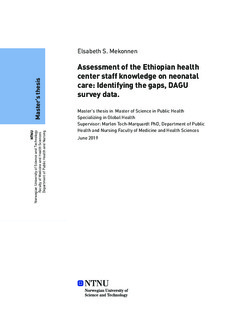| dc.description.abstract | ABSTRACT
Background: The neonatal period – a period between the time of birth and 28-days of life – is the most vulnerable time for a child’s survival and health. A large share of neonatal deaths take place in low income countries, where access to quality health care is low. Even though Ethiopia has implemented policies supporting quality of care improvement through several national initiatives, Ethiopia still belongs to one of the countries with the highest neonatal mortality in in the world, with a current average neonatal mortality rate of 26.7 per 1000 live births.
Methodology: Knowledge was assessed in 175 health centre staff from 4 Ethiopian regions based on a baseline Dagu survey data. The association of participants knowledge was assessed between in-service training, supervision and technical support and length of service years. Analysis was done using SPSS. Ethical clearance was obtained from REK and Dagu data committee.
Result: Generally, from 175 health center staff who participated in the study, adequate knowledge was found: in none of the participants regarding immediate newborn care; in 40% regarding low birth weight care; 22% in feeding problem determination; 21% in care for newborn with feeding problem; 37%, 86%, 67%, 50% regarding identification of signs for severe disease, management of severe disease, identification of signs for and management of bacterial infection respectively; 90% regarding jaundice sign; 2% care for jaundiced newborn; 71% sign of dehydration and 40% regarding dehydration management. Only knowledge regarding care for low birth weight newborns and severe disease and bacterial infection were found to have a statistically significant association with training.
Conclusion: Knowledge regarding immediate newborn care among participants was insufficient. The highest deficit of knowledge was found in immediate newborn care components, identifying and stabilizing newborns with feeding problems and management of jaundice. Efforts are needed to orientate health centre staff regarding immediate newborn care, especially the offer of immediate care after birth and jaundice management. Periodic assessment coupled with refreshment training should be conducted regularly.
Key words: Newborn Care, Adequate Knowledge, Health Centre Staff, Quality of Care | |
